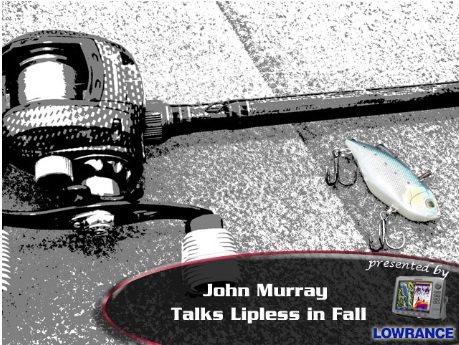
By Dan O'Sullivan
The shad frenzy is on.
Baitfish everywhere, a flipping, flopping swirling mass of bodies billowing
beneath the surface feeding on plankton and driving bass and bass anglers nuts.
The sheer amount of baitfish flitting about in the tributaries can be enough to
make a bass angler's eyes bug out like Marty Feldman.
We've all tried to approach these fish with topwaters,
swim jigs, vibrating jigs and soft plastic jerkbaits to varying degrees of
success. One day we smash their butts, and the next day we can't seem to sniff
a bite.
Bassmaster Elite Series pro John Murray knows the frustration, and he has a
fallback that he has used for several years that has produced when others
don't; that lure is a lipless crankbait.
"I use all of the favorites when the bass are chasing shad in the
fall," he said. "But, I often turn to a lipless crankbait when there
are a lot of shad in an area, and I can't get the bass to bite surface
lures."
Where?
In the early to middle part of the fall, Murray looks for the standard places
that bass will be. "I follow the shad into creeks like everyone
else," he said. "But, I look for flats along the creek arms that have
ditches running through them."
He said those ditches are what bass will use as highways to and from the
shallows of the creeks and it helps him to pinpoint their whereabouts. "If
I can find ditches that have some sort of cover on them, those are the
best," he said. "Rockpiles, grass clumps or
stumps that are on the edges of the ditch are the perfect places to target bass
waiting for a meal."
Equipment and Lures
Murray is a big fan of fiberglass cranking rods for this application.
"I've really grown to like the combination of a fiberglass rod with good
backbone and a light tip and 30-pound-test braided line for my lipless
crankbaits," he said. "I get the feel of the braid with the give of
the glass and that seems to make for a great combination for hooking and
landing fish."
He said that he prefers to use a 6.4:1 retrieve speed reel, even thought there
are higher speed reels available. "The fish seem to be able to take the
lure better when I use the 6.4:1," he said. "The higher speed reels
seem to result in more lost fish."
His lure of choice has become the River2Sea Twin Vibe lipless crankbait. It is
a 5/8-ounce bait with a profile that is slightly smaller than a standard
1/2-ounce lipless bait. The Twin Vibe also features a dual position line tie.
tie it on the front one, and it tracks shallower, tie it on the rear one and it
wants to run deeper.
The rule of thumb for Murray in choosing colors in the fall is to go with as
bright of a chrome color he can get. "Shad are really highly
reflective," said Murray. "The create a lot of flash in the water
when they swim, and I want to mimic that same thing when I throw a Twin
Vibe."
His color choices are Aurora Black for water that is clear to stained, then he
turns to the Pearl White color if the water gets some color to it.
Speed is Key
Murray said that he relies heavily on speed this time of the year. "Shad
really moves quickly through the water column," he said. "So, to get
the response you want from the fish, it's best to get the bait moving and keep
it moving fast."
He said that he used this approach in winning the 2003 Bassmaster Open
Championship on Toledo Bend Reservoir. He said that he found quality bass on
the flats holding near stumps, but that he had a hard time getting them to bite
with any regularity. "I was really searching for things that would make
them bite, and I picked up a lipless crankbait," he said. "When I
started reeling it past the stumps at a really high speed, I started getting
bites."
That was the key component he needed to trigger bites, and he ended up winning
the tournament.
Opposite Late Fall
As the winter draws closer and the water temperature plummets, Murray turns to
a lift and drop retrieve to trigger strikes from bass feeding on dying shad.
"Shad really slow down in the cold weather, and they begin to flutter and
die," he said. "That's when I turn to the River2Sea Tungsten Vibe,
and I pump the lure off the bottom and let it fall back down."
His choice of the Tungsten Vibe is because the lure features a tungsten face
that helps the lure stand up on the bottom and wag side to side as it falls.
"Bass really like that action in the cold weather," Murray said.
Choose Quality Hooks
The one tip Murray said was important was to use high quality hooks on the
baits, especially when anglers choose to burn the bait. "I change out my
hooks to Owner Stinger trebles because they are so sharp and strong," he
said. "Bass really crush these lures and you need good hooks to keep from
bending them out."
Read more like this at AdvancedAngler.com.


 Advertising
Advertising